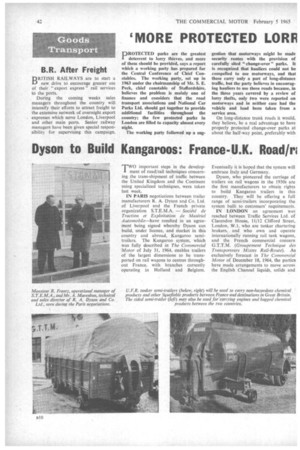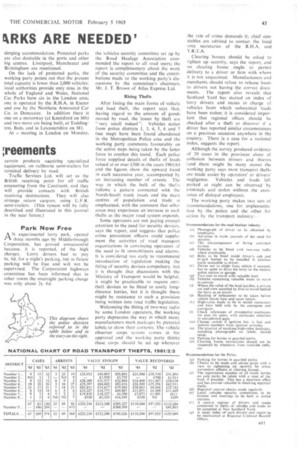'MORE PROTECTED LORI' EtRKS ARE NEEDED'
Page 44

Page 45

If you've noticed an error in this article please click here to report it so we can fix it.
lICIROTECTED parks are the greatest I deterrent to lorry thieves, and more of them should be provided, says a report which a working party has prepared for the Central Conference of Chief Constables. The working party, set up in 1963 under the chairmanship of Mr. S. E. Peck, chief constable of Staffordshire, believes the problem is mainly one of finance and considers that the road transport associations and National Car Parks Ltd. should get together to provide additional facilities throughout the country; the few protected parks in London are filled to capacity almost every night.
The working party followed up a sng gestion that motorways might be made security routes with the provision of carefully sited " change-over" parks. It is recognized that hauliers could not be compelled to use motorways, and that these carry only a part of long-distance traffic, but the party believes in encouraging hauliers to use these roads because, in the three years covered by a review of lorry thefts, only two were reported on motorways and in neither case had the vehicle and load been taken from a service area.
On long-distance trunk roads it would, they believe, be a real advantage to have properly protected change-over parks at about the half-way point, preferably with sleeping accommodation. Protected parks are also desirable in the ports and other big centres. .Liverpool, Manchester and Birmingham are mentioned.
On the lack of protected parks, the working party points out that the present total capacity is fewer than 2,000 vehicles; local authorities provide only nine in the whole of England and Wales, National Car Parks have six in the London area, one is operated by the R.H.A. in Exeter and one by the Northern Armoured Car Co. in Doncaster. In addition there is one on a motorway (at Knutsford on M6) and two more arc being built, at Toddington, Beds, and in Leicestershire on MI.
At a meeting in London on Monday, the vehicles security committee set up by the Road Haulage Association commended the report to all road users; the report is complimentary about the work of the security committee and the contributions made to the working party's discussions by the committee's chairman, Mr. J. T. Brown of Atlas Express Ltd.
Rising Thefts After listing the main forms of vehicle and load theft, the report says that, having regard to the amount of goods moved by road, the losses by theft are " very small indeed ". Vehicles stolen from police districts 1, 3, 4, 5, 6 and 7 (see map) have been found abandoned in the Metropolitan Police area and the working party comments favourably on the active steps being taken by the latter force to combat this trend. Each police force supplied details of thefts of loads valued at or over £500 in the years 1961/63 and the figures show the upward trend in each successive year, accompanied by an increasing number 'of arrests. The way in which the bulk of the thefzs follows a pattern connected with the North-South trunk roads and the main centres ofpopulation and trade is emphasized, with the comment that other areas may experience an increase in such thefts as the major road system expands.
Some operators are not paying enough attention to the need for security devices. says the report, and suggests that police crime prevention officers could supplement the activities of road transport organizations in convincing operators of the need to fit immobilizers and alarms. It is cons:dered too early to recommend introduction of legislation making the fitting of security devices compulsory. but it is thought that discussions with the Ministry of Transport would be helpful; it might be practicable to require antitheft devices to be fitted to costly longdistance lorries, but it is thought there might be resistance to such a provision being written into road traffic legislation.
Welcoming the fitting of two-way radio by some London operators, the working party deprecates the -way in which many manufacturers mark packages by pictorial labels to show their contents. The vehicle observer corps system conies in for approval and the working party thinks these corps should be set up wherever the rate of crime demands it; chief constables are advised to contact the local area secretaries of the R.H.A. and T.R.T.A.
Clearing houses should be asked to tighten up security, says the report, and no clearing house ought to permit delivery to a driver or firm with whom it is not acquainted. Manufacturers and merchants, should refuse to release loads to drivers not having the correct documents. The report also reveals that Scotland Yard has started an index of lorry drivers and mates in charge of vehicles from which substantial loads haVe been stolen; it is considered important that regional offices should be checked after a theft to discover if a driver has reported similar circumstances on a previous occasion anywhere in the country. There is a case for a national index, suggests the report.
Although the survey produced evidence of 29 cases in the provinces alone of collusion between drivers and thieves (and there might be many more) the working party says most transport thefts are made easier by onerators' or drivers' negligence. Vehicles and loads left parked at night can be observed . by criminals and stolen without the assistance of disloyal employees.
The working party makes two sets of recommendations, one for implementation by the police and the other for action by the transport indttstry:-


















































































































































































